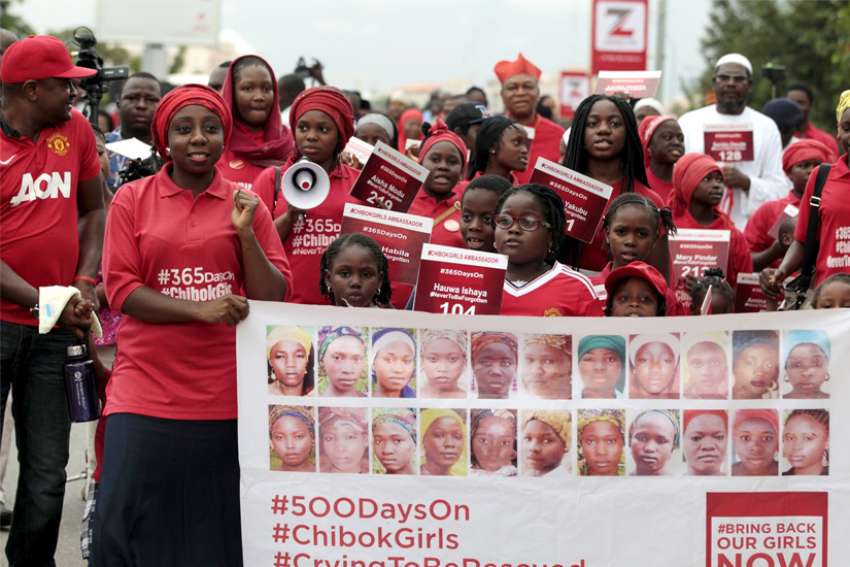“He picks up the phone and that’s the news he gets,” said Lalonde. “The Bishop of course was very worried trying to help and also trying to keep everybody calm. If one party, whoever it is, reacts strongly, then it becomes a risk that the conflict will grow, and it makes it even tougher to resolve these problems. This story dates to 2006. It was happening then and it’s still happening.”
Acts like these are even more common in other countries where Christian women make up a small minority says Lalonde. It’s why on International Women’s Day Tuesday, March 8, ACN will host a video conference to present the organization’s latest report, “Hear Her Cries: The Abduction, Forced Conversion and Sexual Victimization of Christian Women and Girls.” The report, which was co-authored by John Pontifex, Dr. John Newton and Fionn Shiner, includes cases reported directly to ACN and other international agencies, as well as testimonies from women from Nigeria, Mozambique, Syria, Iraq, Pakistan, and Egypt.
In Pakistan for example, the abduction, forced marriage and conversion of Christian girls and women is endemic. According to the report, The Movement for Solidarity and Peace calculated in 2014 that every year up to 1,000 young Christian and Hindu women and girls aged 12 to 24 are abducted and forced to convert to Islam.
In some countries violence occurs because a man wants to date a woman and she refuses. In places of Muslim extremism, the goal is to kidnap women to destroy the Catholic or Christian society. By doing that they ensure the next generation will be Muslim. The rights of these women are not protected, Lalonde says, which is why it becomes easy: kidnappers and attackers are almost never brought to court or even questioned.
The lack of concrete research highlighting facts and statistics around the victimization of Christian women and girls has made drawing global attention to the crisis a challenge.
The report represents a move in the right direction, Pontifex says, in hopes that more research may be conducted in the future. The intention of the Women’s Day event is to raise awareness, to inform the public and put pressure on government officials to move towards change.
“This voice that we’re sending out is a voice that emanates from the heart of the women themselves,” says Pontifex, who is head of press and information with ACN. “We say that authoritatively because we’ve spoken to the victims and one individual that I’ve been in touch with who is in hiding following her escape from her abductor, she actually wrote in her text, ‘I feel like I’m in prison. I’m in hiding. I can’t go out. I’ve not been able to go out for months for fear of my former abductor tracking me down and potentially killing me. Please get me out of here.’ We are responding to that call. We are acting for the women and it’s their voice that we want to put across, not anyone else’s. They need their voices heard. We need to hear their cries.”
Gathering information for such a report is extremely challenging, says Pontifex. Victims and their families are typically reluctant to report incidents of forced conversion, forced marriage and sexual violence mainly due to social shame and fears of retribution. The bravery of the women who came forward in the report cannot be overstated. With the information obtained through research they can shed light on wider problems in many cases.
The research indicates that 95 per cent of women abducted in northern Nigeria by Boco Haram are Christian. This suggests that not only is it the case that sexual violence against women is widespread in that region, but that Christian women and girls are specifically vulnerable. While sexual violence is a problem faced by women around the world, the research demonstrates religious minority girls and women are at heightened risk.
Lalonde stresses it is a human rights problem, not a specifically religious one. ACN is working to address various crises around the world including the war in Ukraine, where they are sending $1.5 million to support the Catholic Church on the ground helping those in need. In the midst of that, she says, it is imperative that violence against Christian women around the world is made a priority.
“Ukraine has become a priority as well and we’re already helping over there, but for these women and girls, I think we have to prioritize it because nobody talks about them,” said Lalonde. “If we don’t do it, nobody does.”
Pontifex and Lalonde say the world is often unwilling to acknowledge Christian and other religious minority women are targeted and made more vulnerable to gender-based violence. There are fears about fuelling hate towards non-extremist Muslim groups. There’s also lack of awareness in Western nations about challenges faced by other cultures, and taboos against speaking about religion openly.
“We have to be clear it is a small minority of extremists,” Lalonde says. “In those countries you will find Christians and Muslims who are friends. The behaviour of a very small group can create a lot of damage.”
“People don’t find it easy to accept the idea that a Christian is persecuted in many contexts,” Pontifex adds.
“Research indicates there are more countries in which Christians are harassed, worse than is the case for any other faith in the world. By that measure Christians are the most persecuted group and yet our society doesn’t want to acknowledge that. This report pushes that open door of outrage at sexual violence but also challenges the norm which does not recognize religious minorities as being specifically at risk, particularly Christians.”


